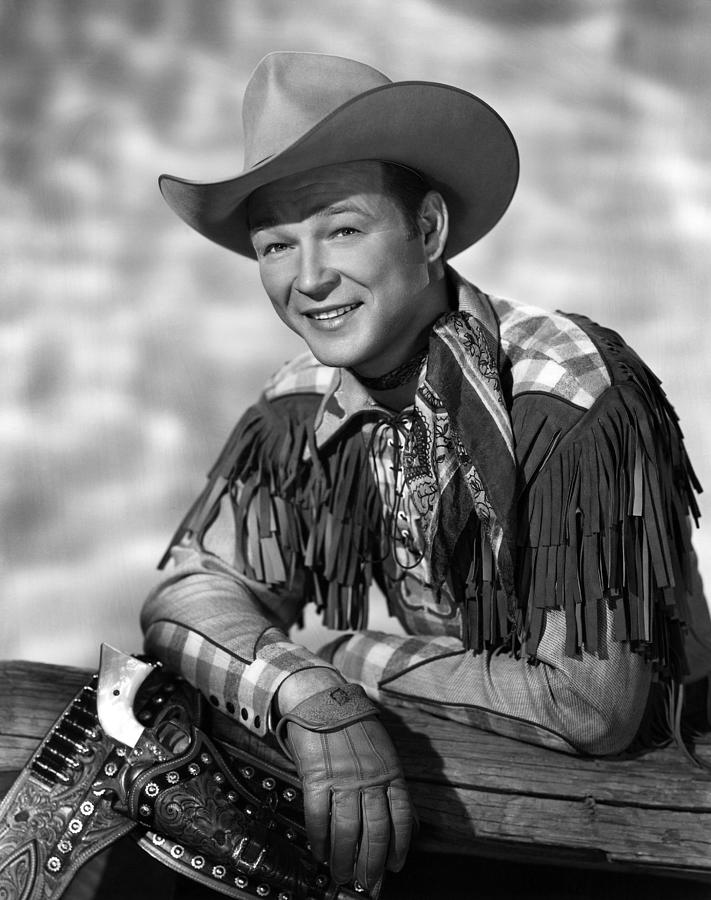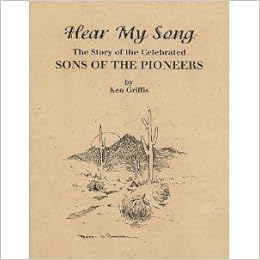You might not think of Chicago as the heart of Western music, but the most famous Western vocal group of all time, the Sons of the Pioneers, lived there for just over a year in 1940-1941.
While they were in Chicago, they performed on the WLS National Barn Dance and recorded over 200 radio transcriptions, called The Symphonies of the Sage, for NBC's Orthacoustic company. Many fans feel that these recordings are among the purest representations of the Sons' sound, because the group was able to choose the songs, write the arrangements, and play all of the instruments free from the influence of a record label.
The Chicago reissue label Bloodshot Revival released a collection of these transcriptions in 2001, and while writing the liner notes for it, I interviewed Hal Spencer. Hal is the son of Tim Spencer from the original lineup of the Sons of the Pioneers and also the president and CEO of the publishing company Manna Music.
The original lineup of the Sons of the Pioneers was Roy Rogers, Bob Nolan, and Tim Spencer, but by the time the Sons moved to Chicago, Roy Rogers had left the group to pursue a solo career. In Chicago, the vocal group comprised Spencer, Nolan, Lloyd Perryman, and bass vocalist Pat Brady. Hugh and Karl Farr, the peerless cowboy jazz artists, added violin and guitar.
I interviewed Hal Spencer twice on March 28-29, 2001. In the second interview, he provided details about a number of things that he didn't know in the first interview.
 |
| Tim Spencer |
Where did you stay?
Do you know how often the Sons were performing on WLS?
During that year, about a half dozen of their films came out. I assumed that they all were filmed the summer prior to the move to Chicago. Or were they shuttling back and forth from Hollywood?
Do you know of any interesting anecdotes from that period?
There was a lot of changes going on, pressures, and they were working extremely hard and were busy and doing a lot of stuff. At that particular time I think that there was some problems with the manager. From the general feeling over the years, the Chicago year was kind of a blur. They did the transcriptions and were happy to do it, but then afterwards, they kind of felt like maybe they had been taken advantage of when they signed off on artist royalties on the transcriptions, and felt like maybe they had made a mistake on the advice of my uncle Leo, that that would be a good deal. But in the long run it turned out to not be.
But I think that was probably just one of the negatives. They felt that the radio work that they did in Chicago at that time was beneficial to their career—extremely beneficial—so they did feel like, from that standpoint, it was worth it. My dad and Bob didn't like all that work. They were more creative people, and that's why they retired as early as they did. They just didn't like the moving around and the going on concert tours and being gone all the time.
 |
| Karl Farr |
To the best of his knowledge, they didn't make any movies during that time—at least for nine months they didn't—because [Karl Farr] never came back to California. My mother says that she doesn't remember the Pioneers going off anywhere during that one-year period except for an occasional personal appearance, which would have been a couple of days if they went to the east, but most of the personal appearances were close enough to whereby they didn't have to go very far, and basically they did the Uncle Ezra show on WLS and stayed there.
Karl Jr. said that he thought the name of the hotel was the North Park Hotel. My mother thought it was the Lincoln Park Hotel [a 500-room hotel at 1931 North Lincoln Park West], but it was an apartment hotel—it wasn't a regular hotel.
Roy Rogers would come into town quite often, Karl [Jr.] says, because his dad would tell him, and his dad was a bowler. And Karl and Roy bowled a lot during the 14 months that they were in Chicago.
 |
| Roy Rogers |
Now, Roy wasn't with the group, but he loved to bowl, and so did Karl, and for some reason he had a little thing going with Karl—a competition—so [Karl Jr.] can remember in the letters from his mom and dad, they would say, "Roy came in and Roy and Karl bowled for three days straight."
Karl Jr. and my mom did not know for sure whether it was a weekly show or a daily show. But they weren't on all the time. They were on regular but that didn't mean they didn't miss the show now and then. But she couldn't remember whether it was a daily show or not.
They aren't pictured in the WLS Family Albums from 1940 and 1941.
My dad wrote that song, and the Sons of the Pioneers recorded it, and when they returned to California in September of 1941, that song was on the hit parade and they didn't even know it. They were all surprised.
Were they all married?
Did Karl Jr. say anything about the movies?
If they did come home—-say it was nine months and they came home after nine months—they could have gone down in a period of two weeks and made a couple of movies just by their appearances. They could have had two different scripts going at the same time. And so it was not unusual, but he believes that it was all done in 1939 and released in 1940.
Yes.
The Standard transcriptions?
My dad claimed that he had the rights to the Standard transcriptions, and I have the contracts where he purchased those for release. In fact, we have it in storage right now, all of the records.
Did you work with Bear Family on their Sons of the Pioneers box sets?
I've been asked by widows and heirs why I'm not doing something about that. When I talk with RCA or I talk with Decca about some of the stuff that goes on over in Europe, they say it costs more money to bring a lawsuit than you would get, and they just ignore it. When I tell the heirs and the widows that, they don't understand.
That's interesting, because Bear Family has a good reputation for paying royalties.
Richard Wieze.
No, that's great. I really appreciate your efforts.




No comments:
Post a Comment